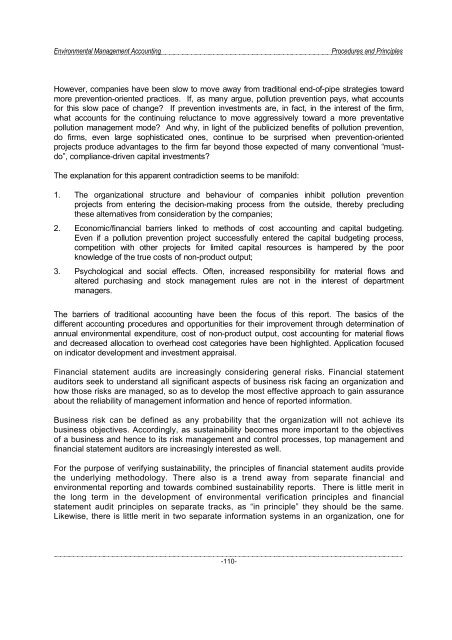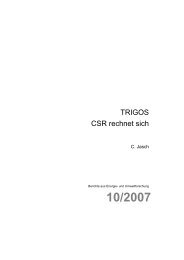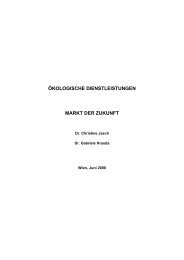Environmental Management Accounting Procedures and Principles
Environmental Management Accounting Procedures and Principles
Environmental Management Accounting Procedures and Principles
You also want an ePaper? Increase the reach of your titles
YUMPU automatically turns print PDFs into web optimized ePapers that Google loves.
<strong>Environmental</strong> <strong>Management</strong> <strong>Accounting</strong><br />
<strong>Procedures</strong> <strong>and</strong> <strong>Principles</strong><br />
However , companies have been sl ow to move away from tradit ional end- of- pipe str ategi es towar d<br />
more pr event ion-or iented practi ces . If , as many argue, poll uti on pr event ion pays , what account s<br />
for thi s slow pace of change? If pr eventi on inves tment s are, in fac t, in the interes t of the fi rm,<br />
what ac count s for the cont inuing rel uct anc e to mov e aggres si vel y toward a more preventativ e<br />
poll uti on management mode? And why, in li ght of the publi ci zed benefit s of pol lut ion prev ention,<br />
do firms, ev en lar ge sophi st icated ones , continue to be surpris ed when preventi on- or iented<br />
pr oj ect s produc e adv ant ages to the firm far bey ond thos e expect ed of many conventi onal “must -<br />
do”, compl iance-dr iv en capit al inv es tments ?<br />
The explanat ion for thi s apparent contr adi ct ion seems t o be manifold:<br />
1. The organiz at ional st ruc tur e <strong>and</strong> behaviour of compani es inhibit pol lution prevention<br />
pr oj ect s from enteri ng the deci sion- mak ing proc ess from the out side, thereby pr ecl udi ng<br />
thes e alternati ves f rom cons iderat ion by t he compani es;<br />
2. Economic /fi nanci al barri ers link ed to methods of cost ac count ing <strong>and</strong> capital budget ing.<br />
Ev en if a pollution preventi on project suc cessf ull y ent ered the capi tal budgeti ng pr ocess,<br />
competi tion wit h other projects for limited capital res our ces is hamper ed by the poor<br />
knowledge of the t rue c ost s of non-product output;<br />
3. Psy chologic al <strong>and</strong> soc ial ef fects . Oft en, incr eas ed responsi bi lit y for mater ial flows <strong>and</strong><br />
al tered purc has ing <strong>and</strong> stock management rules are not in the inter es t of depart ment<br />
manager s.<br />
The bar riers of tr aditi onal acc ounti ng hav e been the focus of this report. The bas ic s of the<br />
di ff erent ac counti ng pr ocedures <strong>and</strong> opportunit ies for thei r impr ov ement through determi nat ion of<br />
annual env ir onment al ex pendi tur e, cost of non-produc t output , cost ac count ing for mater ial flows<br />
<strong>and</strong> dec reased allocation to overhead cost cat egori es have been highli ghted. Appli cat ion focused<br />
on i ndi cat or devel opment <strong>and</strong> inves tment appr ais al.<br />
Financial statement audits are increasingly considering general risks. Financial statement<br />
auditors seek to underst<strong>and</strong> all significant aspects of business risk facing an organization <strong>and</strong><br />
how those risks are managed, so as to develop the most effective approach to gain assurance<br />
about the reliability of management information <strong>and</strong> hence of reported information.<br />
Business risk can be defined as any probability that the organization will not achieve its<br />
business objectives. Accordingly, as sustainability becomes more important to the objectives<br />
of a business <strong>and</strong> hence to its risk management <strong>and</strong> control processes, top management <strong>and</strong><br />
financial statement auditors are increasingly interested as well.<br />
For the purpose of verifying sustainability, the principles of financial statement audits provide<br />
the underlying methodology. There also is a trend away from separate financial <strong>and</strong><br />
environmental reporting <strong>and</strong> towards combined sustainability reports. There is little merit in<br />
the long term in the development of environmental verification principles <strong>and</strong> financial<br />
statement audit principles on separate tracks, as “in principle” they should be the same.<br />
Likewise, there is little merit in two separate information systems in an organization, one for<br />
-110-




